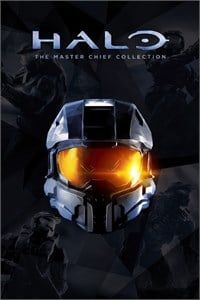Halo: Point of Light interview — Author Kelly Gay talks crafting character-first Halo stories
We recently caught up with award-winning author Kelly Gay to learn about her new book, Halo: Point of Light, as well as a myriad of other related topics.
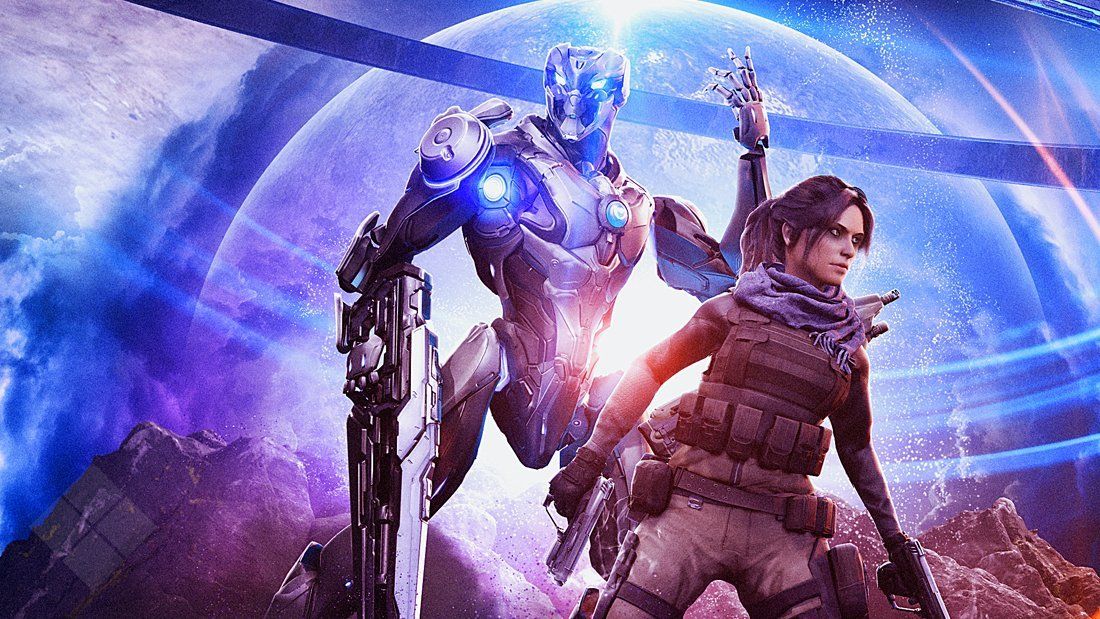
A huge strength of the Halo franchise is its wealth of expanded lore that fleshes out the universe introduced by the games in the franchise. Every year, at least one or two new novels are released that broaden the size and scope of the series' mythos. The latest of these novels, Halo: Point of Light, continues the story of the scavenger Rion Forge and the crew of the salvager ship Ace of Spades set up in Halo: Smoke and Shadow and Halo: Renegades, two earlier novels. As someone who recently finished the book, I can confidently say that it's one of the best Halo novels out there, featuring a riveting plot and some of the best character writing in the franchise.
I recently had the opportunity to chat with Kelly Gay, the author of all three books as well as several award-winning sci-fi/fantasy novels, about what it's like to work on Halo, the ups and downs of the character writing process, what readers can expect from Halo: Point of Light, and more.
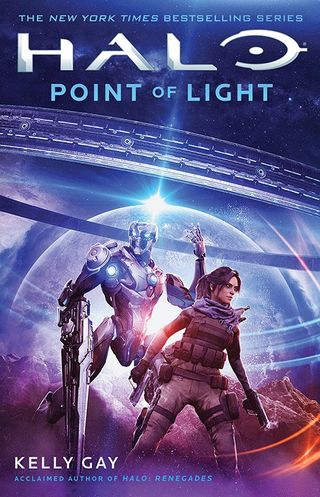
A new story at your fingertips
Halo: Point of Light is Kelly Gay's latest work with the Halo franchise, and thanks to her excellent writing and the riveting plot, it's arguably her best.
Contributing to a universe-sized mythos
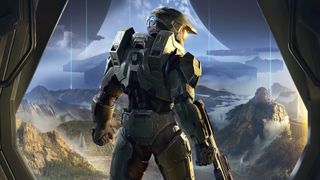
Brendan Lowry, Windows Central: As the official sequel to Halo: Smoke and Shadow and Halo: Renegades, Halo: Point of Light is your third Halo book. How does it feel to be a long-form contributor to the franchise? What are some of the things about working on the series that stick out to you as highlights?
Kelly Gay, author of Halo: Point of Light: It feels great to stick with the franchise over the course of several books, and it's super nice to work with a franchise that is invested in their authors and the stories they tell. I feel very lucky to be able to sit down and stay a while, to really get comfortable with the universe and the characters, and to develop relationships with those I work with. The highlights are working with my editor and 343 — it's always a fun, creative process, and getting the opportunity to get to know Halo fans and Halo lore fans. I love the shared excitement we all feel for the universe, and when new books come out and new lore details are revealed. Outpost Discovery in Anaheim, CA was an incredible experience and a real highlight.
The Halo universe is massive in its scale, and as time goes on, it only continues to grow larger. Does the sheer size of the franchise intimidate you, or does it make you feel like you're playing around in a massive sandbox?
No, not at all. I see it as a massive positive. Because of the sheer size of the universe, the opportunities are endless. It gives me a greater sense of freedom when I write, knowing there are so many options and avenues to explore.
Halo's novel suite has swelled in size over the years, offering fans interested in the series' expanded universe plenty of engaging stories to dive into. Do these books and their authors inspire and/or influence your own writing? Which Halo novel would you say is your favorite, or has otherwise impacted you the most?
Get the Windows Central Newsletter
All the latest news, reviews, and guides for Windows and Xbox diehards.
Silentium is tops for me. That, and the others in the Forerunner Saga by Greg Bear were great inspirations and references to me when writing Renegades and Point of Light. Because we all bring unique stories and writing styles to the table, readers have a lot of options in finding something that appeals to them. Personally, I've very much enjoyed Troy Denning's Last Light and Matt Forebeck's New Blood. Along with Ghosts of Onyx, Kilo-Five, Hunters in the Dark, Shadow of Intent, the Cole Protocol… too many to mention! The comics are also great, and shout out to Hunt the Truth audio series — so good.
A mortal perspective
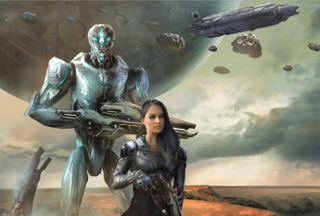
Halo is often characterized by the superhuman lens that most of its stories are told through. Rion Forge, a scavenger, no doubt has a very different perspective on the Halo universe than the Master Chief does. Have you found it exciting to approach writing Halo characters from a more "mortal" point-of-view?
Yes, definitely. It allows me to, hopefully, show readers what it might truly be like for humans in the Halo universe, and allows for the reader to relate to some familiar struggles. Without the armor and training and enhancements of a super soldier, regular humans in space can be pretty fragile beings, so there's a certain level of danger always present and known, and in order to protect themselves and make a viable life for themselves, they must possess a certain level of ingenuity, resourcefulness, stamina and drive. But with those come the darker traits of humanity, which are always fun to explore and write about.
What are some of the core themes that readers can expect with Halo: Point of Light?
Point of Light is really about the family you make, it's about letting go, and finding your place in the universe.
From Spark to the crew of the Ace of Spades to Rion herself, Halo: Point of Light is filled with interesting characters for fans to get to know and love. Can you speak to some of the ups and downs of trying to weave the narratives of these characters together throughout the story?
One of the challenges is always how much time to give the characters for their own personal storylines. You really have to juggle page time and decide which stories need to be told in the time you have allotted for a particular book. And while certain stories must wait, you still have to weave in threads that show their personal growth and story arcs. They all have paths to take, but sometimes you can't show it all, and can only set the stage or allude to possibilities for that character. And sometimes I do want to tidy everything up and give every character the happy ending they deserve, but realistically and especially for Point of Light it's just not the reality of the time period. It's not tidy, things aren't always going to go right. It's definitely a tumultuous time across the colonies!
A familiar face
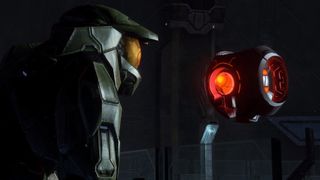
It's been awhile since players defeated 343 Guilty Spark way back in Halo 3. Can you give some insight about what readers can expect from this new "version" of the character in Point of Light? How has the character grown since we Spartan Lasered him on The Ark?
After events in Halo 3, the remains of 343 Guilty Spark were recovered by the crew of the research vessel, Rubicon. The damage freed him from compartmentalization and memories of his human life as Chakas began resurfacing. These he told to the crew — and this became the book Primordium by Greg Bear. Convinced the Librarian is alive, he takes over the ship to search for her. And this is where his story in Renegades begins.
The Rubicon crash landed on Gernaos-a, and in order to save himself, Spark jumped from system to system and finally into the body of an armiger construct, which the Rubicon crew had also recovered from the Ark. He is the sole survivor and spends a few years on this planet repairing his memories and putting the pieces back together of his human life. He grapples with this new version of himself — an AI with all the experiences and past memories and emotions of being human.
He isn't quite sure where he fits in or what his purpose in life might be now. Rion and crew salvage him from the planet and so begins a joint effort to find the Librarian and the Spirit of Fire, (Rion's father's missing ship). Over the course, Spark repairs and changes his armiger form, using the machine cells inside the alloy which allows form manipulation. He finds the Librarian, and she gives him a key… The key leads them on a journey — and this would be the story in Point of Light — that takes Spark back to a Halo and onward to finding his place in the universe.
When working with elements of the "high science fiction" Forerunner-focused side of the Halo franchise, is it difficult to try and craft intimate, grounded character narratives? If so, how do you approach that goal?
No I don't find it difficult because the characters come first, before the science fiction, before the futuristic elements, and technology, and everything else. They exist first. And when they do, the other stuff exists around them. This way, they become the drivers through this futuristic universe. It's their lens that we view the world, and this way everything becomes more intimate and human and relatable.
Does Halo: Point of Light have any new characters that fans can look forward to meeting? If so, what can readers expect from these new faces?
Yes! But that's all I can say because I wouldn't want to spoil anything.
Your thoughts
What do you think of Kelly Gay's experiences with working on Halo, her approach to writing characters for the series, and more? I'd love to know, so make sure to leave a comment down below. Also, make sure to follow her on Twitter and check out her blog so you can stay up-to-date with her future work, which will no doubt be excellent.
I highly recommend reading Halo: Point of Light if you haven't done so, too. It's a fantastic book that any Halo fan will love, even if you haven't read Kelly Gay's previous Halo novels. If reading isn't your style, check out Halo: The Master Chief Collection, which bundles all of the pre-Xbox One era Halo shooters for $40 and features tons of next-gen upgrades, which is awesome. It's one of the best Xbox shooters available, and it's also a great game to play while waiting for Halo Infinite, which is expected to release in Fall of 2021.
Brendan Lowry is a Windows Central writer and Oakland University graduate with a burning passion for video games, of which he's been an avid fan since childhood. He's been writing for Team WC since the summer of 2017, and you'll find him doing news, editorials, reviews, and general coverage on everything gaming, Xbox, and Windows PC. His favorite game of all time is probably NieR: Automata, though Elden Ring, Fallout: New Vegas, and Team Fortress 2 are in the running, too. When he's not writing or gaming, there's a good chance he's either watching an interesting new movie or TV show or actually going outside for once. Follow him on X (Twitter).
